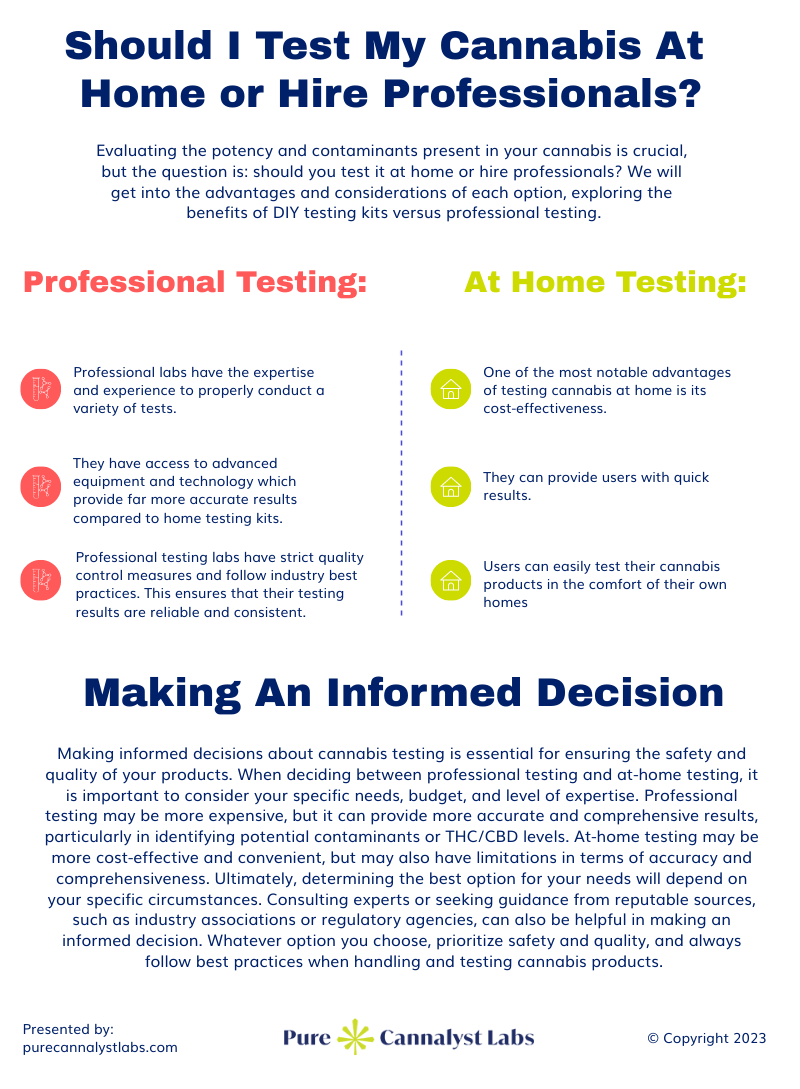Are you a cannabis enthusiast or a medical user who wants to ensure the utmost quality and safety of the cannabis you consume? Evaluating the potency and contaminants present in your cannabis is crucial, but the question is: should you test it at home or hire professionals? We will get into the advantages and considerations of each option, exploring the benefits of DIY testing kits versus the expertise and accuracy provided by professional cannabis testing services. Join us as we weigh the pros and cons, helping you make an informed decision on whether testing your cannabis at home or seeking professional assistance is the right path for you.
Table of Contents
ToggleThe Importance Of Testing Cannabis
Testing cannabis is very important for several reasons. First and foremost, it is crucial to ensure the safety of consumers. When cannabis goes untested, there is an inherent risk of contamination, including the presence of harmful pesticides, residual solvents from extraction processes, or even mold and bacteria. Such contaminants can pose significant health risks when consumed, potentially leading to respiratory problems, allergic reactions, or other adverse effects.
Furthermore, testing cannabis is essential to determine the potency and consistency of the product. Cannabis strains vary widely in their THC and CBD levels, and accurate testing allows users to make informed decisions about dosage and consumption. For medical cannabis patients, knowing the exact cannabinoid content is particularly important as it helps in tailoring treatment plans and managing symptoms effectively.
Ensuring product purity is another critical aspect of cannabis testing. By analyzing a cannabis sample, you can detect and quantify harmful substances and ensure that the product is free from toxins and impurities. This purity extends beyond the absence of contaminants, as it can also involve the detection of any unwanted additives or diluents.
Testing Cannabis at Home
Testing cannabis at home has become increasingly popular among cannabis enthusiasts and individuals who want to try and ensure the quality and potency of their cannabis products. The concept of testing cannabis at home involves using home testing kits specifically designed to analyze various aspects of the plant, including THC and CBD levels, as well as the presence of contaminants such as pesticides or mold.
There are several home testing kits available on the market, each with its own set of pros and cons. One of the most notable advantages of testing cannabis at home is its cost-effectiveness. Home testing kits are generally affordable and can provide users with quick results, saving them money and time compared to sending samples to a laboratory for analysis.
Another advantage of testing cannabis at home is the convenience it offers. Users can easily test their cannabis products in the comfort of their own homes, without the need to rely on external laboratories or testing facilities. This convenience is particularly beneficial for individuals who consume cannabis regularly and want to make informed decisions about their purchases.
However, it is important to acknowledge the limitations and potential inaccuracies of home testing. Home testing kits will not always provide lab-quality results and can be less accurate than professional laboratory analysis. Additionally, home testing kits may not be able to detect certain contaminants or provide detailed information about specific strains or cannabinoids. It is crucial for users to understand the limitations of home testing and to consider sending samples to certified laboratories for a more comprehensive analysis if necessary.
Hiring Professionals for Testing
There are many advantages to hiring professionals for cannabis testing in Irvine. Professional labs have the expertise and experience to properly conduct a variety of tests, such as potency testing, pesticide screening, heavy metal testing, microbiological analysis, and more. They also have access to advanced equipment and technology which provide far more accurate results compared to home testing kits.
Furthermore, professional testing labs have strict quality control measures and follow industry best practices. This ensures that their testing results are reliable and consistent. In contrast, home testing kits may not be as accurate or reliable due to improper sample collection or human error.
Making An Informed Decision
Making informed decisions about cannabis testing is essential for ensuring the safety and quality of your products. When deciding between professional testing and at-home testing, it is important to consider your specific needs, budget, and level of expertise. Professional testing may be more expensive, but it can provide more accurate and comprehensive results, particularly in identifying potential contaminants or THC/CBD levels. At-home testing may be more cost-effective and convenient, but may also have limitations in terms of accuracy and comprehensiveness. Ultimately, determining the best option for your needs will depend on your specific circumstances. Consulting experts or seeking guidance from reputable sources, such as industry associations or regulatory agencies, can also be helpful in making an informed decision. Whatever option you choose, prioritize safety and quality, and always follow best practices when handling and testing cannabis products.
Being a Cannabis Dispensary In California
Now, if you are a cannabis dispensary and selling cannabis to the public, self-serve or at-home kits are not an option as professional testing is required. In California, the cannabis industry is highly regulated, and ensuring product safety and quality is of utmost importance. This is where professional cannabis testing comes into play. By having your products tested by accredited laboratories, you can ensure that they meet the state’s stringent standards for potency, purity, and safety. Professional testing provides accurate and unbiased results, giving both you and your customers confidence in the products you offer.
Infographic

